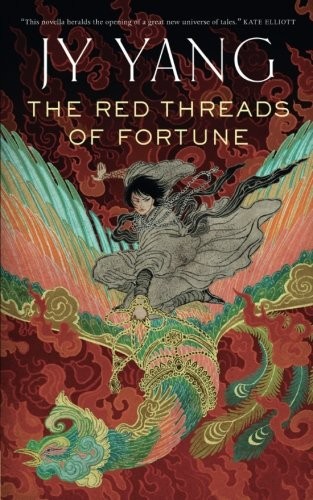enne📚 reviewed The Red Threads of Fortune by JY Yang
The Red Threads of Fortune
4 stars
This book is the second novella in the Tensorate series. I had read that this followed Mokoya instead of the way the first novella followed Akeha and also that these first two novellas could be read in any order. Because of that, I had half expected that this was going to be some John Scalzi Old Man's War Lost Colony vs Zoe's Tale situation, following Mokoya off-page during the events of the first novella. However instead, this book is some time after the first novella ends and feels to me that it gives a lot less background on the world than the first book. I am not sure I can imagine reading them in the opposite order.
If the first book is about struggling against the tides of fortune, that theme very much continues here, however it's also a tale about trauma and grief and fractured relationships. One thing that …
This book is the second novella in the Tensorate series. I had read that this followed Mokoya instead of the way the first novella followed Akeha and also that these first two novellas could be read in any order. Because of that, I had half expected that this was going to be some John Scalzi Old Man's War Lost Colony vs Zoe's Tale situation, following Mokoya off-page during the events of the first novella. However instead, this book is some time after the first novella ends and feels to me that it gives a lot less background on the world than the first book. I am not sure I can imagine reading them in the opposite order.
If the first book is about struggling against the tides of fortune, that theme very much continues here, however it's also a tale about trauma and grief and fractured relationships. One thing that works a lot better in this book for me is that because it is not stretched across so many years (in needing to do worldbuilding lifting and character development), it's a much tighter plot and overall is a lot more satisfying to me.
I really enjoy the technological detail of Mokoya having visions of the future but also having a way to physically capture and record these visions in a way that can be revisited in the future. It's a nice detail that plays in really well as a coping mechanism for grief.
In ongoing gender feelings about this series, this book mentions "archaic gender-neutral first person pronouns" indicating that maybe the push towards binary gender is a more recent (or possibly localized) development. I also appreciate the focus on a new non-binary character here as well. Interested to see what if anything continues on the gender worldbuilding front for the other two novellas.


